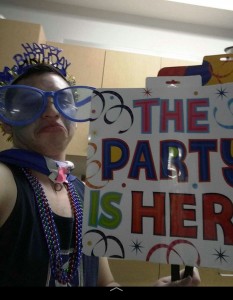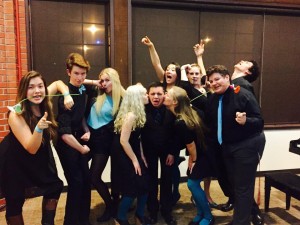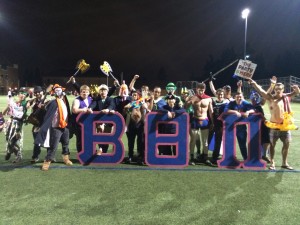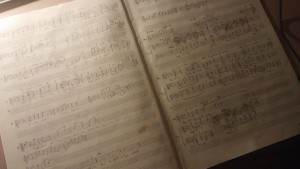- Inferno, Dante Alighieri
- What’s scarier than Hell? Here, you have the honor of being led by Virgil on a tour of the nine circles and, in the end, you make the acquaintance of Lucifer. Find a version with Gustave Doré’s engravings—they’re beautiful.
- A Portrait of the Artist as a Young Man, James Joyce
- Read it for Father Arnall’s sermon on Hell (chapter three), which is almost as scary as Hell itself.
- Nightwood, Djuna Barnes
- Like a good horror movie, half of the scares come from not knowing what’s going on. The other half of the scares come from the extent to which obsession dominates the characters in this book. Bonus points for a final scene of hazy parallelism (possession?) between a woman and a dog.
- A Pale View of Hills, Kazuo Ishiguro
- Ishiguro’s is a subtle horror, which navigates the terrain between the psychological and the philosophical fluidly. Ishiguro is sparing in his clues, leaving only enough to tantalize the reader in the not-knowing.
- Steps, Jerzy Kosinski
- Steps is bizarre and sure to unsettle. At times, it seems that this slim volume is only a collection of perversion and violence, though to the discerning eye, it is always, if improbably, more.
- Nausea, Jean-Paul Sartre
- The weight of meaninglessness impinges to claustrophobic effect in Nausea, which, after 200 pages, lingers like the void that surrounds us.
- The Book of Revelation, John of Patmos
- The final book of the Bible features a cast of characters of immense mythological significance—such as the Dragon and the Beast 666, and, of course, God—doing immensely scary things.
- The Sense of an Ending, Julian Barnes
- This short novel relies on tenuous causal links to question the range of human agency. Did I cause this to happen, or is it just a coincidence? The not-knowing is consuming and a source of epistemological dread.
- 1984, George Orwell
- An unlikely choice, but: Rats! Additionally, the vision of totalitarianism that the novel presents is as relevant today as it was in 1949 (the year of publication), what with contemporary concerns of surveillance and negationism.
- 2666, Roberto Bolaño
- I’ve mentioned 2666 before, but it bears inclusion on this list, for it details one of the worst sprees of crime in recent memory, with an intentional dispassion that heightens the horribleness of the acts. Read it.
Monthly Archives: January 2016
In the Land of Misfit Toys
In which vulgarity is used, kings are named, and much has been lost, but so much more has been gained.
To my dear reader,
I would consider much of my life to have been wasted. If I were to point to two things that I am proud of, however, one would be my time in my a cappella group Underground Sound. The other would be my time in the Delta Epsilon colony of the Beta Theta Pi fraternity. Both are places full of unexpected individuals, unpredictably put together – lands of misfit toys, of which I am most certainly one.
When I first joined Underground Sound, it was a frail, unfocused group of poor musicians. Leadership was weak, rehearsals were ineffective and performances bland. For two semesters, I watched as the group floundered, losing members and failing to draw in audiences.
When I first joined Beta Theta Pi, there were no other members aside from the representative from the national fraternity there to recruit new members. Even as the chapter size slowly grew, the members were often apathetic and confused. For three semesters, I eyed the colony warily, and felt an emotional distance I was sure was insurmountable.
I became a musical co-director of Underground Sound in my sophomore year, and alongside my co-director Lisa Hawkins, I struggled, fought, cried and reshaped the group’s entire approach to a cappella across the past two years. In October of 2015, we were unexpectedly accepted to compete in the International Championship of Collegiate A Cappella, making us the first Puget Sound group to do so.
I attended a Beta leadership program called the Wooden Institute in my junior year, and began to take on leadership within the colony. Alongside my brothers, I wrestled, wept, celebrated and formed a community across the past year. As of January 26th, 2016, after extending bids to the few students we connected with, we have acquired only two new members – an unexpected and disappointingly low number.
Some would call my time with Underground Sound a success. They would be correct. It has taught me how to inspire a group, organize rehearsals and communicate clearly and efficiently. It is because of my time there that I am confident as a musical director and leader.
Some would call my time in Beta Theta Pi a failure. They could not be more incorrect. It has taught me how to trust others, give selflessly and uncover the unending depth of my own heart. It is because of my time there that I have ever felt a home at the University of Puget Sound.
Some people will look at Underground Sound and scoff at its earnest but musically imprecise performances. Some people will look at the Delta Epsilon colony and sneer at its small size and poor recruitment record. To those people, I have only one thing to say:
Fuck you.
Fuck your arrogance, fuck your derisiveness, and fuck your judgement. I have learned and loved more than you can possibly know. The land of misfit toys is my kingdom, and you’d better believe that I am the King.
With all due respect,
Daniel Wolfert
No Wrong Answer
When I first started Rush or Recruitment or whatever it’s called, I was just in it for the food and activities. I mean, who doesn’t love free food, mini-golfing and go-karting? Greek Life wasn’t really the thing for me anyway. I didn’t want to live in a house full of messy guys I barely shared any interests with.
But, things changed. I met the guys from the different house and got to know a lot of them. Now I’m sitting in my dorm room after the preference dinners, not really sure what to do.
I’m torn between two Fraternities. My experiences with these two houses have shown me that my own time at Puget Sound wouldn’t be complete without participating in Greek Life. I won’t say names, so I’ll just refer to them as John and Bob.
Now John and Bob, they’re both great guys. From day one, they were incredibly welcoming. John was really interested in what I had to say while I talked to Bob about Star Wars for a good 20/30 minutes. I could be this huge gamer nerd with Bob, but John was a Geology major, what I intended to be.
And the list just goes on and on.
I went back in forth between their houses all weekend, gathering as much info as I could to help me make my decision. I even had breakfast with John and grabbed lunch with Bob today before preference dinners to try to get a better read on them. All I know is that I had a ton of fun these last few days and got absolutely nowhere in terms of a decision. Everything I learned about them just made them seem even more awesome.
In the end, both John and Bob are just amazing. In a situation like this, there is no wrong answer. That makes this decision just that much harder.
Right now, the Fraternities are sitting in a room, figuring out who to give bids to. There’s no guarantee that I’ll receive bids from either of these Fraternities. But I know that if I do receive a bid or two, I’ll make the right choice.
Connection to Place
Traveling back to school, navigating airports and delayed flights, always seems to kick-start the inevitable rush of being back. Running to gates and staring out the window of the plane as the sun starts to fade below the clouds are the first steps to finally putting off studying and bumping into friends around campus. There’s something relaxing in the familiarity of it all, something that keeps me up a little bit later the night before the flight.
It’s always a hassle though. I fly out of one small airport that has one gate and one rickety plane that sounds so loud that it must not be good. are you sure this is safe??? to San Francisco, with foggy skies and a multitude of delays. I came prepared this time, though. A half-knitted scarf; a book I had barely started*; podcasts I had yet to listen to**; and a lunchbox filled with an assortment of snacks.
I found myself talking to the guy sitting next to me. We had both been staring down the aisle, watching the flight attendant fiddle with bags. She opened up an overhead bin to tuck a strap into it. By the time she managed to close it, the fabric had fallen out again. I glanced at him: “Did you see…”
He grinned and nodded, “I’m glad someone else caught that.”
The plane started moving along the runway and we settled into an amicable silence. The plane stopped. The lights went off. A static voice came on the speaker and said that there was some sort of technically difficulty. They were working on it. We would just have to wait a bit. The lights would come on in a minute.
“How long do you think it’ll take us to get to Seattle?” he asked.
“I feel like we’ll be there within five hours.”
He informed me that I jinxed us and if we didn’t make it there it’d definitely be my fault. We fell into a steady rhythm of asking each other questions. His name was Lenny, a nurse living in southern California. He traveled to Thailand, worked in fly fishing for years, and was visiting his brother’s eight-month-old son. In turn, I told him about my inability to walk on flat surfaces, that I like my tea with no milk or sugar, and when I was little I wanted to be both a princess and an astronaut.
We had fallen back into silence when he asked me what my favorite place in the world is. Numerous places fell into my mind, places that give me the feeling I get when I’m sitting up late at night talking to friends and when I stand overlooking the Sound and I feel connected to everything.
“There’s this place, about forty-five minutes from my house. Off of an old highway, a few miles down from the campground I’ve been going to since I was five. The campground where I read Harry Potter; sat cross-legged in the entry kiosk talking to the camp ranger; swung from a rope swing and cannon-balled into the river. A few miles down there’s this small-loop trail, carved between a forest-floor of redwood sorrel and ferns that stretch up to my chin.
“Part of Star Wars Return of the Jedi was filmed there and there’s this tree trunk with its root structure spanning fifteen feet high. Off of the main path there is a smaller grove within the grove. There’s a sole big leaf maple tree with moss growing up the side of the trunk. A green glow is cast on everything and I can’t define exactly what it is but it’s something.”
I haven’t been to Cheetham Grove in months, but I still feel a connection to the place. I think that’s how I’ll feel about Puget Sound after I graduate. Even when I’m not on campus, I’ll still feel a part of something greater.
*The Bell Jar by Sylvia Plath
**Dear Hank & John, Filler Podcast, and the Mortified Podcast.
10 Selections from Hanya Yanagihara’s A Little Life
I’ve been mentioning Hanya Yanagihara’s A Little Life quite a bit, so I thought I’d provide a, hopefully, spoiler-free taste.
- “The world has two kinds of people… Those who are inclined to believe, and those who aren’t. In my courtroom, we value belief. Belief in all things.”
- “He was practical; he knew that making a career as a lawyer meant sacrifices, either of money or of moralities, but it still troubled him, this forsaking of what he knew to be just. And for what? So he could insure he wouldn’t become that old man, lonely and sick? It seemed the worst kind of selfishness, the worst kind of self-indulgence, to disavow what he knew was right simply because he was frightened, because he was scared of being uncomfortable and miserable.”
- “The axiom of equality states that x always equals x: it assumes that if you have a conceptual thing named x, that it must always be equivalent to itself, that it has a uniqueness about it, that it is in possession of something so irreducible that we must assume it is absolutely, unchangeably equivalent to itself for all time, that its very elementalness can never be altered.”
- “If I were a different kind of person, I might say that this whole incident is a metaphor for life in general: things get broken, and sometimes they get repaired, and in most cases, you realize that no matter what gets damaged, life rearranges itself to compensate for your loss, sometimes wonderfully.”
- “Wasn’t it a miracle to have survived the unsurvivable? Wasn’t friendship its own miracle, the finding of another person who made the entire lonely world seem somehow less lonely?”
- “But although he hadn’t been convinced, it was somehow sustaining that someone else had seen him as a worthwhile person, that someone had seen his as a meaningful life.”
- “And he cries and cries, cries for everything he has been, for everything he might have been.”
- “He experienced the singular pleasure of watching people he loved fall in love with other people he loved.”
- “Friendship was witnessing another’s slow drip of miseries, and long bouts of boredom, and occasional triumphs. It was feeling honored by the privilege of getting to be present for another person’s most dismal moments, and knowing that you could be dismal around him in return.”
- “You won’t understand what I mean now, but someday you will: the only trick of friendship, I think, is to find people who are better than you are—not smarter, not cooler, but kinder, and more generous, and more forgiving—and then to appreciate them for what they can teach you, and to try to listen to them when they tell you something about yourself, no matter how bad—or good—it might be, and to trust them, which is the hardest thing of all. But the best, as well.”
This Is the New Year
In which resolutions are made, midnights unraveled and the final chapter of this story is finally begun.
To Daniel Wolfert,
It is New Year’s Eve of 2015 in Raleigh, North Carolina, and once again, you are at home with your family and no plans whatsoever. You had visions of spending New Year’s Eve in the city, looking up at stars and the endless throng of joyous humans. Instead, you play Skyrim with your sister and eat oatmeal-cranberry cookies.
You are upset partly because you dislike having no plans, and partly because you like big events, but mostly because it is always at midnight that you begin to become most yourself.
This is not a good thing.
Midnight feels to you like the answer to a puzzle, or maybe a riddle; something strange and translucent that slips through your fingers. Midnight marks the beginning of your kingdom, a wide expanse of loneliness and desire for validation and a terrible, gnawing ache deep in your gut that asks why you are always alone.
Midnight marks the time when you desperately want to be around people, and yet seem to watch others as if from an island across a vast ocean.
Midnight twines its fingers into your ribcage and interrogates you:
Time is so short.
Time is so precious.
Have you wasted what little I gave you?
Have you done enough?
Midnight lays your memories out before you like Tarot cards on a Seer’s desk: you try to assemble them into something meaningful but can never seem to do so. You pore over your loneliness like gold in the dark. You rifle through the memories as if searching for something but only find the ones that will remind you the stories you never wrote, of the songs you never sang, of the boys you never kissed and the days you never savored.
You rifle through memories of other midnights, of other puzzles and riddles you never figured out. You write this letter to yourself well past midnight three weeks later, turning over the thought of this, your last semester at Puget Sound, poring over your loneliness like gold in the dark.
You do not like New Year’s Resolutions, I know. But if you are to make one, let it be this: waste no more midnights. Write your way out of them.
Write your way back to the sunrise, or back into your bed, or back to the kitchen to make tea or poetry or song.
Write your way to music like a collective symphony of all the stars you have ever seen.
Write your way to a better kingdom, to legend and myth and monsters poring over their loneliness like gold in the dark, and when this new year’s midnights come and ask whether you have done enough, what you have written will speak for you.
With all due respect,
Daniel Wolfert
Rush Hour Interview
I left for my three o’clock interview at twelve o’clock. I did this for two reasons. First of all, the interview was in Seattle and I was in Olympia. And second of all, I have a propensity to get lost whenever I drive to a new place. I’ve left my little sister alone in a parking garage twice because I got lost and it made me late when I was supposed to be picking her up from the train station. Needless to say, she was not pleased either time.
This was my first interview since I graduated and I wanted to be prepared. I had a copy of my resume, my social security card, a brush, deodorant, and a book. It turns out that I really did need the book because after all my planning and worrying I arrived at the interview site an hour and a half early. So I ended up sitting in the lobby reading The Wizard of London and munching on a power bar.
The interview itself went reasonably well. It was a group interview for a recruiting agency, CampusPoint, that works with recent grads. There were two recruiters and seven of us seated around a conference table trying not to stammer too much. Personally, I only said um once and shook both recruiters’ hands at the end of the session. For me this counts as a win—one of life’s small victories. If nothing else, it was good practice.
I don’t have very much interview advice yet because I’ve only done one but I will say this: If you get lost and start going down First Avenue in Seattle, they will not let you make a left turn to go back up. Left turns are forbidden. And if you can help it schedule your Seattle interviews so you’re not leaving the city at rush hour. Driving home in Seattle rush hour traffic feels like an Odyssey. Only instead of dreaming of getting back to Penelope, you’re dreaming of collapsing on your couch with a bag of popcorn and some M&Ms. Let yourself have as many as you want.
Food Back Home
There’s nothing like food from home. I’m not talking about homemade food, I’m talking about food from your hometown, stuff exclusive just to your area. With a city like mine, where there’s nothing to do and new restaurants popping up every other week alongside those that had been around for years, I had a lot on my plate this past break, literally.
- Poki Bowl – This place opened up during fall semester, so I never got the chance to try it until break. Poke is a Hawaiian raw fish salad that served as an appetizer. Poki Bowl, and other similar restaurants, add their own spin on it by letting customers build their own rice or salad bowls. Imagine Chipotle, except fish and you can only get bowls. Once you pick your fish, you can add toppings and sauces, making each bowl truly unique.
- KoJa Kitchen – This restaurant actually used to be a food truck. They were so successful that they established a few location around the Bay Area. What makes them special is that they developed a totally new sandwich by combining Korean (Ko) and Japanese (Ja) cuisine. The inside of the sandwich can be one of a few different meats or vegetarian with toppings and sauces. To kick it up, KoJa replaced tradition bread buns with crispy garlic rice buns. They also have amazing fries, Kamikaze Fries. They’re crisscut fries with minced beef, kimchi, japanese mayo, red sauce and green onions.
- Iguanas – This family-owned restaurant has served some of the best burritos and nacho fries in the Bay Area for the last couple years. The burritos are pretty straightforward, with your choice of meat and beans. The nacho fries are exactly what they sound like. Nachos, except fries instead of chips. What makes this place stand out is the famous Orange Sauce and the Burritozilla. Their orange sauce is literally from the gods. I love it so much that I all I can taste is the sauce when I eat at Iguanas because I use so much. I would drink a gallon of the sauce, given the chance. The Burritozilla is a 5 pound burrito. The restaurant has signs on the wall declaring it the “Pizza-killer” and “Burger Killer”. I’ve never tried it myself, but I will someday.

- In-n-Out – Do I really need to explain? I’m a Californian through and through. 4 months without In-n-Out almost killed me. It was the first place I went to when I got off the plane in California and the last thing I ate before flying back here.
10 Books I Want to Read in 2016
These are the top ten books I want to read in 2016, ranked based on priority.
- Cloud Atlas, David Mitchell
- I need to break into the David Mitchell bubble, and why not start with his most well-known work? Besides, I already have this book on my shelf, and it’s been waiting to be read for some time now.
- The Vorhh, Brian Catling
- Another book I already own (I didn’t get around to it this break). I’m fascinated by the premise of this novel, which, as I understand it, follows a cast of characters as they converge and diverge in a mystical forest that may or may not contain the Garden of Eden. Exciting, fantastical stuff.
- The Royal Family, William T. Vollman
- Based on the intensity with which a few recommenders recommended this book to me, I’ll read The Royal Family as the inaugural book this summer.
- Fear and Trembling, Søren Kierkegaard
- This one comes recommended by a friend, who read it over winter break. An early modern interpretation of Christianity and the nature of faith by the father of existentialism.
- The Book of Night Women, Marlon James
- Recommended to me by a professor. Marlon James also won the 2015 Man Booker Prize for A Brief History of Seven Killings, which is, of course, a sure, if not certain, stamp of approval.
- Infinite Jest, David Foster Wallace
- Infinite Jest has been on my radar for some time now, and having recently watched The End of the Tour, I’ve decided I can’t ignore it for much longer. I’ll aim to read this over summer, which I think is the best time to read such a capacious novel.
- Fifth Business, Robertson Davies
- Another book recommended by a friend, I’m actually being forced into reading this one. I’ve read positive reviews of it, however, which is promising.
- Underworld, Don DeLillo
- A professor recommended Underworld to me based on my predilection for Roberto Bolaño. I’ve dipped my toes into DeLillo waters with Falling Man and Point Omega, though these are post-Underworld DeLillo works, which I’m told are not the same. It’ll be thrilling to read three massive tomes by Vollman, Wallace, and DeLillo over summer.
- Blood Meridian, Cormac McCarthy
- I’ve been told so many things about this book—that it’s violent, unnerving, and comparable to Herman Melville’s Moby-Dick and Dante Alighieri’s Inferno—that I can’t put it off for another year.
- The People in the Trees, Hanya Yanagihara
- Yanagihara’s first novel. Though I don’t expect The People in the Trees to equal A Little Life, I do hope to be moved the same by Yanagihara’s storytelling and characterization in a more condensed form. It would also be nice to get a grasp on Yanagihara’s oeuvre before it gets larger.
10 Least Favorite Books from 2015
I supposed I should accompany my list of favorite books from 2015 with a list of my least favorite books from 2015.
- A Room with a View, E. M. Forster
- Granted I read this book in a hair salon as I was waiting for my mother, I forgot what this book was about after I finished it.
- The Fall, Albert Camus
- I just couldn’t get into this one. More difficult than The Stranger, The Fall doesn’t posses the same narrative heft that The Stranger does, making it philosophically denser and unmitigated.
- Notes from Underground, Fyodor Dostoyevsky
- Another philosophical novel that eludes me. I wanted to get into Dostoyevsky, so I started with this “short” 130-page book. It was the longest 130 pages I’ve read. I’ll read this one, and Camus’s The Fall, again when I have a more sophisticated mind and/or a better taste for existentialism.
- Paterson, William Carlos Williams
- My experience reading Paterson reminded me of my first experience reading “The Waste Land”: basically, wondering, “What is going on?” (Grateful for teachers.) There were some sections of this book-length poem that I liked, though my inability to appreciate the whole made it hard for me to like the poem overall.
- The Sound of Waves, Yukio Mishima
- I (provisionally) blame this one on the translation. The plot drew me, but the patchiness of the prose (translation) prevented me from enjoying the story. I read The Sound of Waves as an introduction to Mishima’s work with the intention of then moving to his masterwork, The Sea of Fertility tetralogy. I haven’t given up on Mishima, though my experience reading The Sound of Waves has lowered Mishima on my list of books to read.
- Monsieur Pain, Roberto Bolaño
- I discovered Roberto Bolaño during my sophomore year, and read a string of great books written by him (Amulet, By Night in Chile, Distant Star, Last Evenings on Earth, The Savage Detectives, A Little Lumpen Novelita, 2666), so when I read Monsieur Pain I was disappointed. I never felt a sense of the narrative or of the characters while reading the novel. Admittedly, Monsieur Pain is not one of Bolaño’s popular books.
- The Woman in the Dunes, Kobo Abe
- Maybe it is a translation issue with these Japanese works, because I had the same issue reading The Woman in the Dunes that I had reading The Sound of Waves. The plot is intriguing: a man is held captive in a house at the bottom of a sand dune and spends his days shoveling sand. However, despite the promise of its premise, I couldn’t get into the story, which is written in an artificially translated prose.
- The Sea, John Banville
- I had high expectations for this novel, given the stature of its author and the fact that it won the Man Booker Prize. That said, I did not dislike the novel, though I didn’t care much for it. My lukewarm response to the book was drawn out because of the hype it got and because I spent $15 on it.
- My Happy Life, Lydia Millet
- An underwhelming book in my estimation. Not altogether bad, but what could otherwise have been a compelling story is undermined by language that’s mild at best.
- All the Light We Cannot See, Anthony Doerr
- Yes, it won the Pulitzer Prize, but there’s something about a writer who writes, “She wakes to Madame Manec… climbing to the third floor the fourth the fifth” (instead of writing “climbing to the fifth floor” or “climbing the stairs”) and repeats this technique every fifty pages that irks me. I know Marie-Laure is blind, but this over-repetition becomes tiresome quickly.








